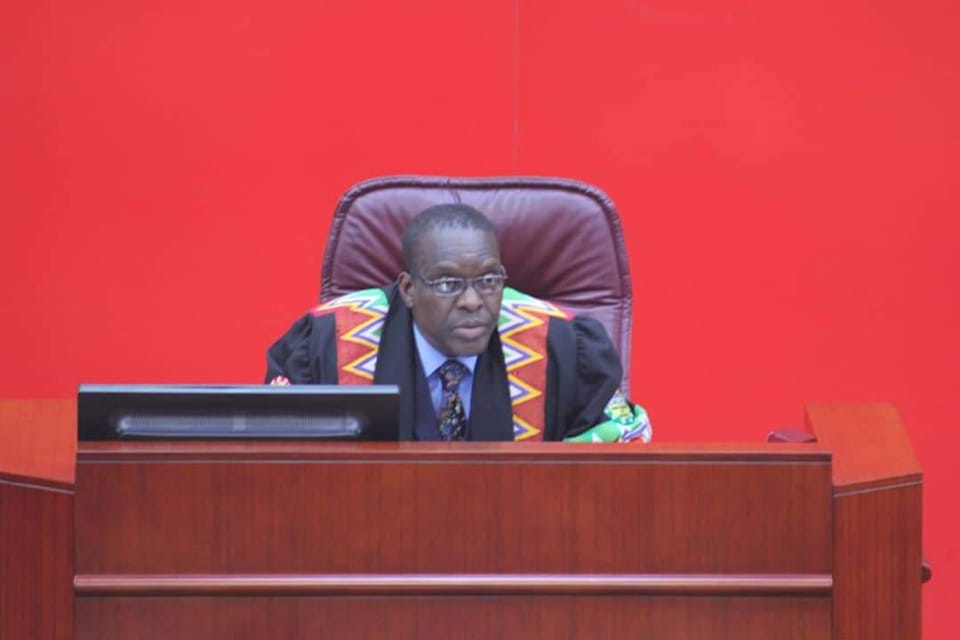
MPs fight. In name of poor?
I may, if I land a very good lawyer who understands my pocket, be on my way to the Supreme Court. Not for litigation.
I want to know what clause or article in the 1992 Constitution or Standing Order or practice of Parliament empowered The Speaker, Rt Hon Alban Bagbin, to rule on November 27 that with 137 Members of Parliament (MPs) present and voting, the 2022 Budget was deemed rejected.
If 137 was enough to throw out a Budget, why would another 137 MPs, on December 1, this time all the New Patriotic Party (NPP), not be considered a good number to overturn the previous decision, and had to require the vote of First Deputy Speaker, Joe Osei Owusu, presiding, to come up to 138?
For posterity’s sake, my case at the Supreme Court will also seek its ruling on whether the First or Second Deputy Speaker, presiding, lose the power to vote, and that the Speaker (with the definite article), even when he is outside the jurisdiction and not in his Seat in Parliament, can make directions to bear on Parliamentary proceedings.
Talking law, was Otumfuo Osei Tutu II clothed with legal powers when he issued a legal opinion on Parliamentary practice and the Law?
Listen to him, speaking at the launch of his Commemorative Gold Coins on January 12: “It is to our good that our representatives in Parliament subject the national budget to the most vigorous scrutiny and to call for changes… But our representatives need also to bear in mind that it is not their duty to determine policy for the Executive or to frustrate them from performing the legitimate duties.”
With his categorical “it is not their role”, was Otumfuo proffering a legal opinion or merely offering words of wisdom as a respected elder in the society?
Mercifully, the Minority has said that they are not out to make governance impossible and that they are only exercising their constitutional duty to hold the government in check.
To avoid all of that, why don’t we abolish the system under which known political activists or sympathisers are elected as Mr Speaker, including the two Deputy Speakers?
Solution: Let us appoint Justices of the Superior Courts of Judicature (from Appeals to Supreme Court) as Speaker, with two High Court judges as First and Second Deputies. To do that, make the study of the constitution, Standing Orders of Parliament and Parliamentary practices mandatory for all Supreme, Appeals and High Court judges.
Enough! We should put an end to this practice where a Majority or Minority side in Parliament will “wait for Mr Speaker” or Deputy Speaker before moving a motion requiring a vote – because they know s/he will find a reason to be unfair.
How did we arrive at this junction in our parliamentary democratic practice when we cannot even pretend to be objective.
Of course, everybody is, in the opinion of Aristotle, “politicos bios”, but an openly neutral Speaker, not elected by Parliament but by an Electoral College of Media, Civil Society and the Judiciary, will not be so flagrantly and abusively partisan.
Budget
Back to the budget debate, I don’t like taxes myself; nobody does, especially when they are excessive, and when there is plenty of evidence of profligacy and affluent living at the expense of the taxpayer. But taxes are taxes: they are a sine qua non.
Remember, Jesus asked his disciples to catch a fish and take a coin from its mouth to pay their personal income taxes.
I was one of those whose eyebrows shot up when then Running Mate Dr Bawumia, in 2015/6 announced, to throaty cheers of NPP supporters, that “the money is there” and that on assumption of office, the NPP will abolish the NDC’s nuisance taxes.
Indeed, Nana Addo went ahead, as promised, to abolish them. What name are Ghanaians giving to the taxes in his 2022 budget?
Can Dr Bawumia hear the tear-choked voice of the people? They are complaining against “nuisance taxes”. Economics has come full circle.
In like manner, I ask the NDC. In gleefully delaying the approval of the 2022 Budget, how else does it expect the government to finance its programmes and fulfil other obligations, including salaries for civil servants, payment to road and building contractors and even the salary of the MPs themselves?
If e-Levy is anti-poor, as NDC is championing, is it not the same party that imposed taxes on condoms, cutlasses and savings etc. when it was in office?
In the name of which poor masses did it impose levies on Kayayei (the poorest of the poor) and increase VAT/NHIL to 17.5 per cent?
In opposition, both sides claim to be fighting for the poor.
